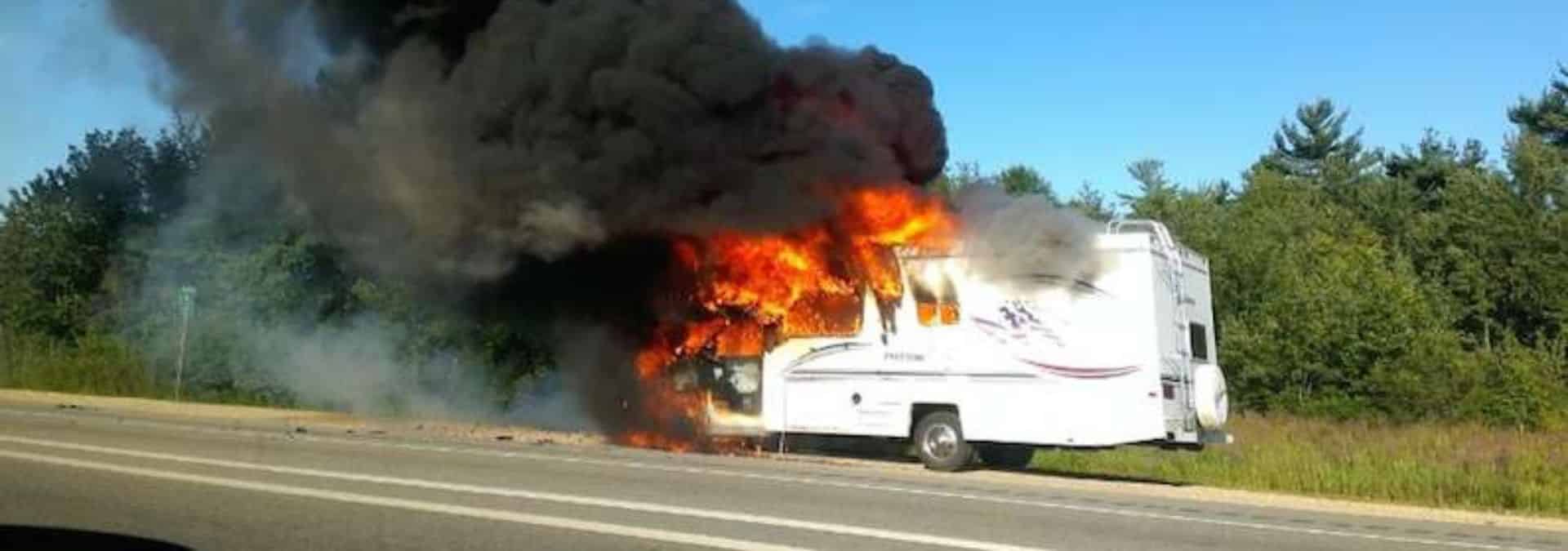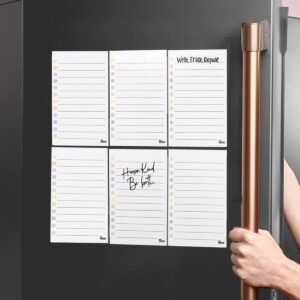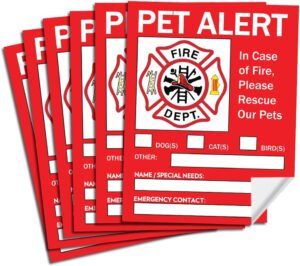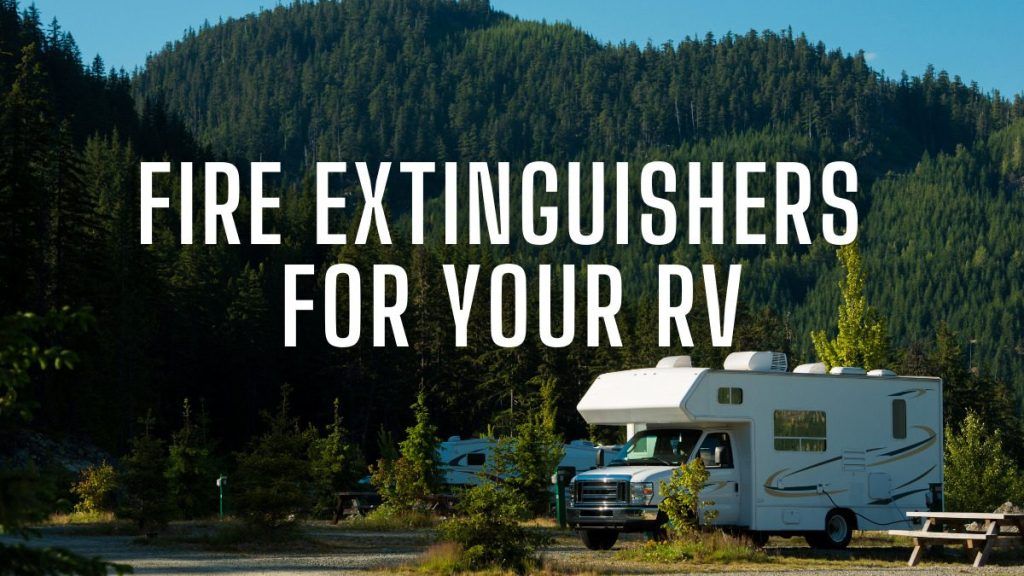RV Fire Safety Tips & Life-Saving Info

Around 1,000 RV fires are reported every year! Here's what you need to know, including a list of life-saving RV fire safety tips…
One of the biggest fears many RVers have is fire, and for good reason — each year, RV fires cause deaths, injuries, and millions of dollars in damages to RVs just as fires happen in our homes and businesses.
10 RV Fire Safety Tips
We compiled the top RV fire safety tips and added resources to help make your RV safe!
Remember to take fire safety precautions before hitting the road and during your camping trip!
If you buy something through our links, we may get a small commission at no extra cost to you. It helps keep our lights on so we can continue to provide helpful resources for RVers. Read our full affiliate disclosure here.
Tip #1: Memorize Campground Name & Campsite Number
One of the essential RV fire safety tips is to memorize the name of the campground you are staying in and your campsite number. In case of an emergency, this information will help emergency responders locate you quickly.
This is a valuable safety tip for all emergency situations. To take it one step further, we recommend keeping the following information on your RV’s fridge for every place you stay:
- Call 911 (If you have small children)
- Campground Name
- Campsite Number
- Camp Office Phone Number
- Directions to the Nearest Hospital
- Directions to Nearest Pet Hospital
- Your Health Insurance Information
Keeping this information on hand can save precious minutes in the case of an emergency. This reusable checklist magnet with a fridge marker holder makes it easy.

Tip #2: Check Your RV Propane System Annually
Propane is an excellent source of energy for RV appliances, but it can also be dangerous if not handled properly. It is crucial to check your RV propane system annually, ideally by a professional.
A leaking propane tank can cause a fire or even an explosion. We recommend reading 7 RV Propane Safety Tips to Prevent an EXPLOSION.
Tip #3: Do Fire Drills
Just like at home, it’s a good idea to practice fire drills in your RV. Make sure everyone in your group knows what to do in case of a fire.
Assign each person a specific task, such as calling 911 or grabbing the fire extinguisher, and designate a place to meet outside after evacuating the RV.
Tip #4: Place “Pet Inside” Sticker on your RV Door
Many RVers travel with their pets, and need to take additional steps to protect them. In case of an emergency, you want to make sure that your pets are not left behind.
Placing a “pet inside” sticker on your RV door will alert first responders that there are pets inside that need to be rescued.

Tip #5: Be Careful with Electric Heaters
Electric heaters are a popular source of warmth in RVs during colder weather. However, they can be dangerous if used incorrectly or if left unattended.
Make sure your electric heater is in good condition and placed in an area where it won't tip over. Better yet, get a heater that automatically shuts off if it tips over.
It’s best to use RV electric heaters in the 750-1,000-watt range to avoid overworking your electric system. Or, only use the “low” setting if it has a higher wattage.
Tip #6: Use a Low Watt Hair Dryer
Just like electric heaters, hair dryers can overload the electrical system and cause a fire. Use a low-wattage hairdryer, like this 1,000 watt mini travel hair dryer.
Also be sure not to use your hair dryer and electric heater simultaneously. That’ll likely tax your system and increase your risk of an electrical fire.
Tip #7: Use Flameless Candles
Candles can create a cozy atmosphere in your RV, but they are a significant fire hazard. Instead, you can use flameless candles that look like the real thing.
These battery-operated candles are actually made of real wax! They have a remote control and timer function. Their batteries can last over 350 hours.
Tip #8: Keep & Maintain Fire Extinguishers
Having a fire extinguisher in your RV is a must. Make sure you have at least one fire extinguisher and that it is readily accessible.
Check the expiration date and make sure it is in good condition. And check it out every season! There are so many RVs that only have expired fire extinguishers in them– which defeats the point!
Lastly, teach everyone in your group how to use a fire extinguisher. Here is a list of the 5 Best Fire Extinguishers for Your RV.

Tip #9: Regularly Check Smoke Alarms
Smoke alarms are essential in any home, including your RV. Make sure you have a smoke alarm installed in every sleeping area and replace the batteries once a year or as needed.
Be sure to test them regularly. Make it a part of your pre-road trip checklist!
Tip #10: Regularly Check CO Detectors
Ensure you have a carbon monoxide detector installed in your RV and that it works correctly. Test it regularly and replace the batteries once a year or as needed.
A CO detector will alert you if gas is present, saving you from carbon monoxide poisoning and a possible explosion.
The Dangers of Carbon Monoxide While RVing
Speaking of which, carbon monoxide poses a very big risk to RVers as well. According to the CDC, approximately 50,000 people end up in the emergency room each year due to accidental CO poisoning. Worse, at least 430 people die.
CO poisoning is a serious risk, especially where any fuel-burning machines or appliances exist. As we all know, an RV itself is a fuel-burning machine with plenty of fuel-burning accessories in and around it!
Learn how to detect CO and how to identify early signs of CO poisoning. Plus, implement these 11 tips to keep your RV safe from carbon monoxide. Keep reading…
RV Electricity Dos and Don’ts From a Pro
Like what you see in these videos? We'd appreciate it if you would Subscribe to our YouTube Channel (easy to do right here) and consider “ringing the bell icon” to be notified of any new video from us. 🙂 Thanks!
Mike and Jennifer's Great Lakes Shoreline Tour (U.S. Side)

Instead of the usual 7 Days that some of our other guides can be done in, with this one, we’re suggesting that you budget more time. This is why we are calling it a “Tour” instead of a 7-Day Guide! There are 86 pages in this new ebook.
In this new Great Lakes Shoreline Tour we cover in detail:
- Notable U.S. Cities/Towns along each Great Lake (US side) like Watertown, Grand Island, Geneva-on-the-Lake, Vermillion, Mackinaw City, and so many more!
- What to See/Do Around EACH Lake: Ocqueoc Falls Scenic Site, Les Cheneaux Islands, Antique Boat Museum, and many, many more places, including BONUS side trips!
- And good Campgrounds for each Lake (US side) – at least 4 or 5 for EACH Lake! With all the info you need to set up reservations.

I found something that every RV should have when it comes to Fire Safety. The Fire Blanket. I’m sure you have seen these advertised. They are ideal for stove top fires and campfires. I asked a local fire chief about their viability and he sad everyone should have one in their Home, Car, RV and anywhere there is a potential for a fire. I have one on my Rig hanging on the wall for easy access. I like that should a fire start on top of my stove I can extinguish it without making a mess of my whole rig with a fire extinguisher. I actually found a good deal on Amazon for 20 of them and I gave them out as Christmas gifts and everyone loved them.
Thank you for sharing, Michael! Team RV Lifestyle